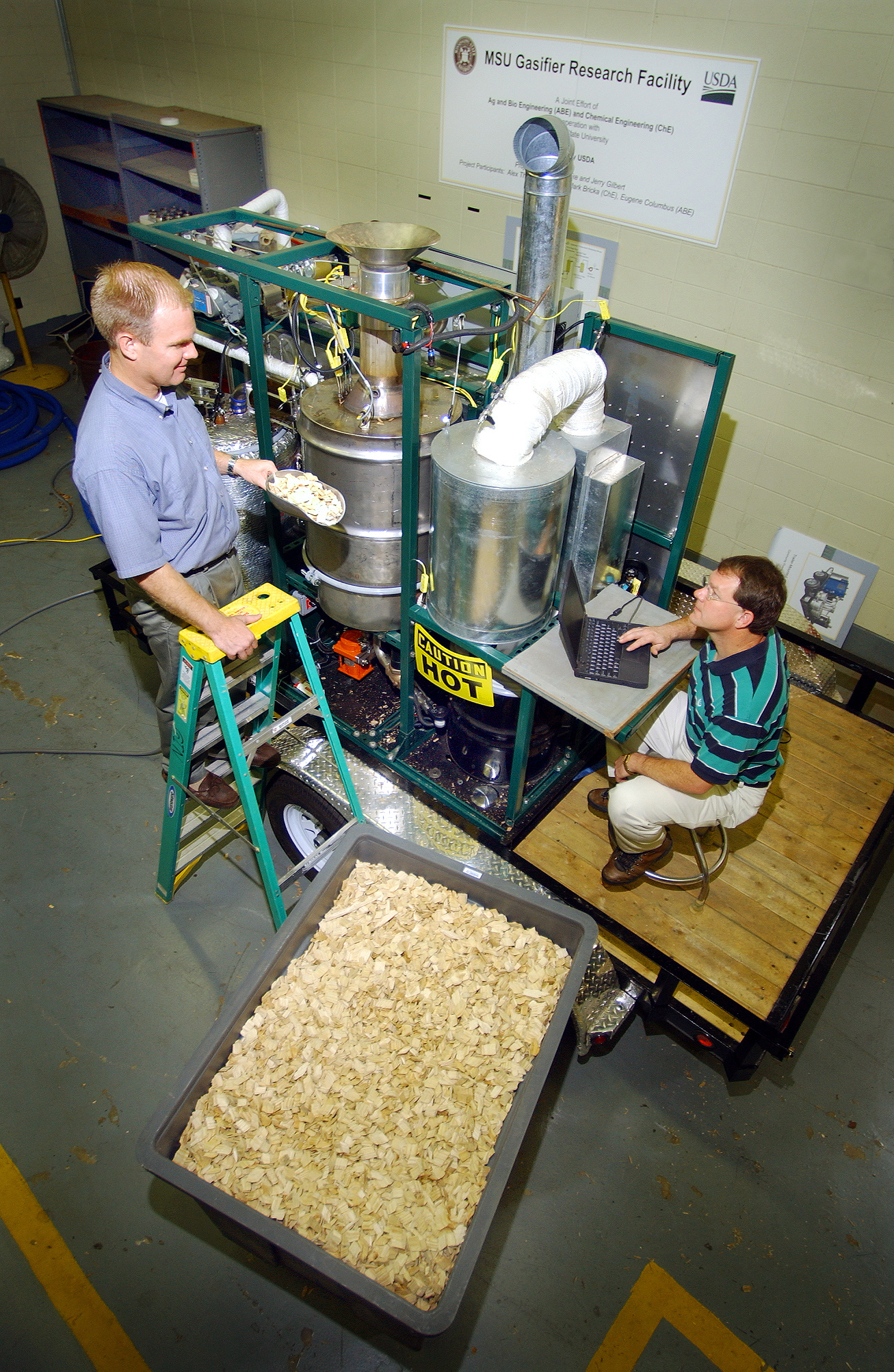Contact: Phil Hearn

Mississippi State researchers Alex Thomasson (l) and Mark Bricka feed wood
chips into the university's recently purchased Biomax gasifier, one of only six
such machines in the world.
If a couple of Mississippi State professors appear excited about having gas, it's because they're producing it with some extraordinary new equipment that turns wood chips and agricultural waste into energy.
Alex Thomasson and Mark Bricka are using a Biomax gasifier-- the only such unit in Mississippi and one of only six in the world--to determine how to efficiently convert various biomass materials into gases and, subsequently, into energy-related and value-added chemicals such as ethanol and acetate. The machine, which arrived on campus in mid-August, is built by Community Power Corp. of Littleton, Colo.
The associate professors are working under a two-year-old U.S. Department of Agriculture grant that evenly divides about $1 million a year between MSU and Oklahoma State University. Researchers at both institutions are experimenting with grasses and residues from various crop processes such as cotton gin waste, rice husks and chicken litter.
"Coming up with additional crops farmers can grow for profit is important to the USDA," said Thomasson, a member of the agricultural and biological engineering faculty. "In a larger sense that even touches on homeland security, the government is interested in any domestic energy source that can replace fossil fuels and allow the country to be more self-sufficient."
Bricka, a researcher in the Swalm School of Chemical Engineering, ranks Mississippi as among the "richest states" in biomass resources. Installation of the CPC Biomax gasification unit "provides a one-of-a-kind, world-class research tool for MSU," he added.
"Farmers can grow biomass crops and get a relatively high yield on marginal land," Bricka said. "We can produce biomass forever and if we can convert it into energy or energy-related products, it will provide more energy security."
MSU used $177,000 of the USDA grant to purchase the gasifier from CPC, and pay for initial installation and operational support by CPC engineers. Now resting on a 12-foot trailer at MSU's Pace Seed Technology Laboratory, the computerized, downdraft model represents CPC's latest technology.
Company engineer Jim Diebold said the U.S. Forest Service operates three such gasifiers at sites in Colorado and New Mexico. Two other models are located at the University of North Dakota and at a coconut mill in the Philippines.
"The gasifiers could be used as a source of emergency power replacement," said Bricka, noting Mississippi economic developers currently are working to "attract CPC as an industry to manufacture the machines" for use by state businesses.
"They can be more cost-effective than using a generator, which relies on gasoline," the Nashville, Tenn., native said.
Added Thomasson: "CPC's original vision was to provide small-scale power for villages, such as in the Philippines. Residents could feed coconut shells into a gasifier and produce electricity for the village, providing it's a relatively small power requirement. In our research, however, we want to use the gas to produce chemicals instead of electricity."
The Houston, Texas, native explained the overall process of converting biomass to chemicals this way: "The gasifier converts biomass by low-oxygen thermal decomposition into a gas mixture--including hydrogen, carbon monoxide, methane, carbon dioxide and water. A separate biological reactor system being developed as a part of the same research effort will be utilized to mix the gas with organisms such as bacteria in a fermentation-type process in which the organisms convert the combustible components of the gas mixture, primarily hydrogen and carbon monoxide--into chemicals such as ethanol and acetate."
In a separate but related project, MSU engineering faculty and staff of the university's Diagnostic Instrumentation and Analysis Laboratory are using a different gasification technology to help Mississippi Ethanol of Winona accomplish the conversion of biomass into ethanol for use as a gasoline additive. The U.S. Department of Energy and members of Mississippi's congressional delegation are supporting the Montgomery County project.
Bricka and Thomasson said the cooperative research effort between the departments of agricultural and biological engineering and chemical engineering will help solidify the Mississippi Agricultural and Forestry Experimental Station and MSU's Bagley College of Engineering as leaders in the field of gasification research.